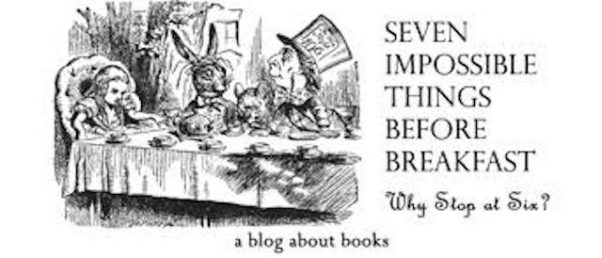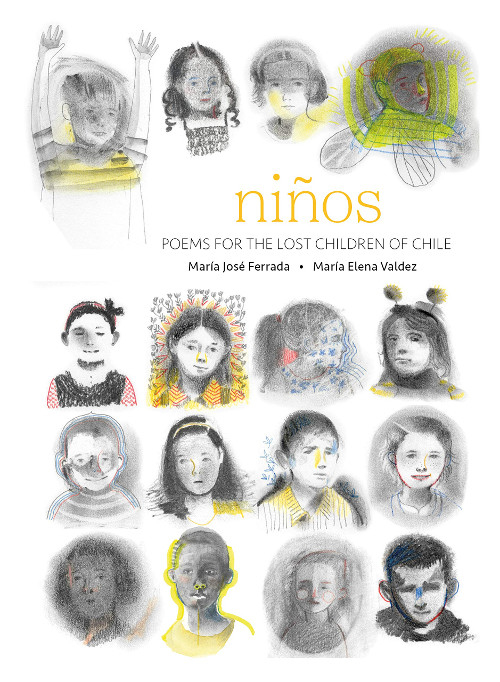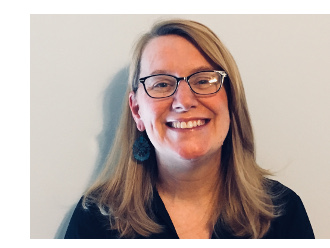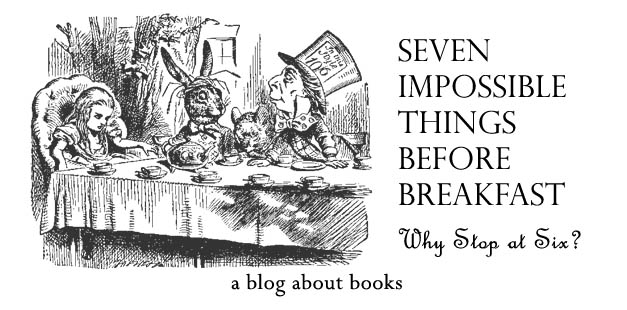
By Jules

“Paola: She saw an insect for the first time./She was so happy that for the entire morning/her heart didn’t stop buzzing.” (Click spread to enlarge)
María José Ferrada’s Niños: Poems for the Lost Children of Chile (Eerdmans, March 2021), illustrated by María Elena Valdez and originally published in Spanish in 2019, is an experience–the kind of book you want to mark out some time for and take in slowly and reverently. It is a tribute to the thirty-four children under the age of fourteen who died or disappeared during Augusto Pinochet’s dictatorial 17-year regime in Chile.
This set of poems includes one for each lost child–the one closing the book (pictured below) dedicated to Pablo Athanasiu, who was found alive in 2013–and they are brief triumphs. Evocative and lyrical, many of them are about nature and many of them about light and sound. Jaime “made friends with the birds who lived in the tree outside his window” and dreams he can visit the nest; Soledad listens to the unique sounds that raindrops make; Magla is fond of the sound that bubbles make when they disappear; Carlos wonders about the light in his lamp (“he wonders if it speaks the same language as the two-million-year-old stars”); and Gabriel imagines that the stars are “holes in the sky …”
“When the sun hides itself,
the Earth is covered by a black coat.
It is so old it has holes –
thus, those lights.”
Ferrada, who has a poet’s powers of observation, captures the unadulterated innocence of these children; each poem is a richly nuanced snapshot of their place in nature. It all sings with a tenderness, moving (and painful) in the knowledge that these children were never found. Her use of figurative language is striking (“It was a perfect afternoon, sweet like licorice”), and there is a powerful, plainspoken elegance to these words. María Elena Valdez provides muted, soft, and subdued illustrations on a delicately colored palette. Spring becomes a bear with a cub on her back; Gabriel’s night sky (that you read about above) is a creature in a black coat, on the move over the earth; the earth fits into a glass of water for a child who imagines “a sky inside the cups.” Words and art here are perfectly balanced. The translation by Lawrence Schimel is seamless.
I wish I had many more spreads to show you below, but this powerful reflection on political violence in the lives of children is one I highly recommend you find on your own anyway. Take some time with it.

“Sergio: That spring he decided/he would plant words in a flowerpot/He would carefully water the seeds/The seasons would pass/He would watch them bloom.” (Click spread to enlarge)

“Pablo: When I grow up I’ll be a tree, a cloud,/a wave,/a snail./And all those shapes/that can be seen in the clouds I’ve learned to stare at./A tree, a cloud, a wave, a snail./When I learn to speak,/these words will be the first things I’ll say.” (Click spread to enlarge)

NIÑOS: POEMS FOR THE LOST CHILDREN OF CHILE. First published by ©Alboroto ediciones, Mexico, 2019. First published in the United States in 2021 by Eerdmans Books for Young Readers. English language translation copyright ©Lawrence Schimel, 2021. Illustrations reproduced by permission of the publisher, Eerdman’s Books for Young Readers, Grand Rapids, Michigan.
 Julie Davidson (Jules) conducts interviews and features of authors and illustrators at her acclaimed blog, Seven Impossible Things Before Breakfast, a children’s literature blog primarily focused on illustration and picture books. “Ninos: For the Lost Children of Chile” was posted at 7-Imp on April 4, 2021 and is reprinted here with permission.
Julie Davidson (Jules) conducts interviews and features of authors and illustrators at her acclaimed blog, Seven Impossible Things Before Breakfast, a children’s literature blog primarily focused on illustration and picture books. “Ninos: For the Lost Children of Chile” was posted at 7-Imp on April 4, 2021 and is reprinted here with permission.


